Reflection and Action Plan - Managing Project Teams, RMIT University
VerifiedAdded on 2022/11/29
|7
|2004
|202
Report
AI Summary
This report is a student's reflection on a project management course, focusing on key concepts such as groups and teams, conflict management, ethics, and motivation. The student discusses their decision-making skills, resilience, and understanding of various theories like Tuckman's stages of group development, bounded rationality, and interactionist views on conflict. They identify strengths in self-regulation, empathy, and conflict reconciliation, while also acknowledging areas for improvement, particularly in providing adequate motivation to team members and responsiveness to changes. The report also examines the importance of aligning project management with organizational strategies and concludes with a summary of the learning outcomes and areas for future development in the field of project management. The student references several academic sources, including works by Schwalbe, Heagney, Kerzner, and Shelley & Maqsood, to support their reflections.
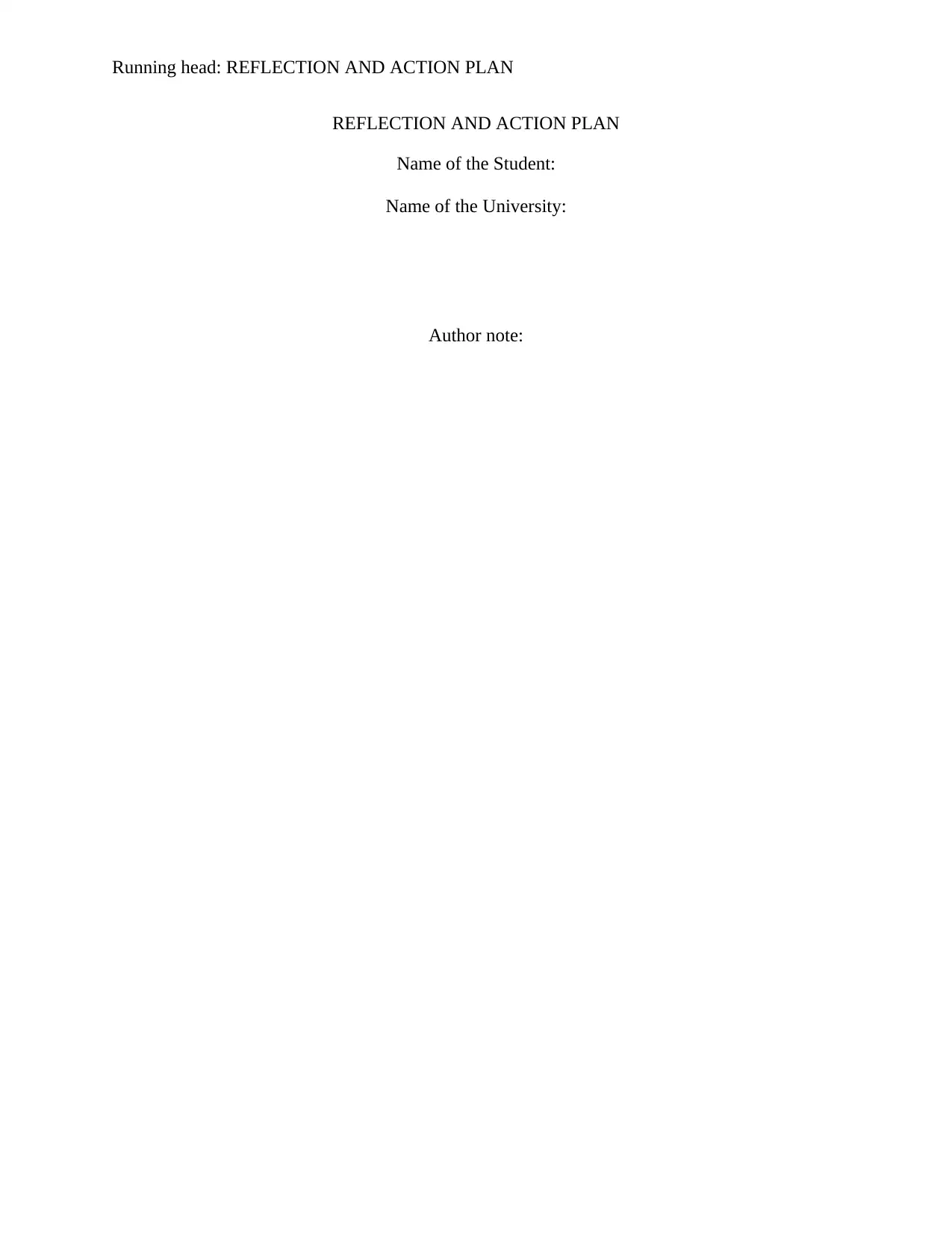
Running head: REFLECTION AND ACTION PLAN
REFLECTION AND ACTION PLAN
Name of the Student:
Name of the University:
Author note:
REFLECTION AND ACTION PLAN
Name of the Student:
Name of the University:
Author note:
Paraphrase This Document
Need a fresh take? Get an instant paraphrase of this document with our AI Paraphraser
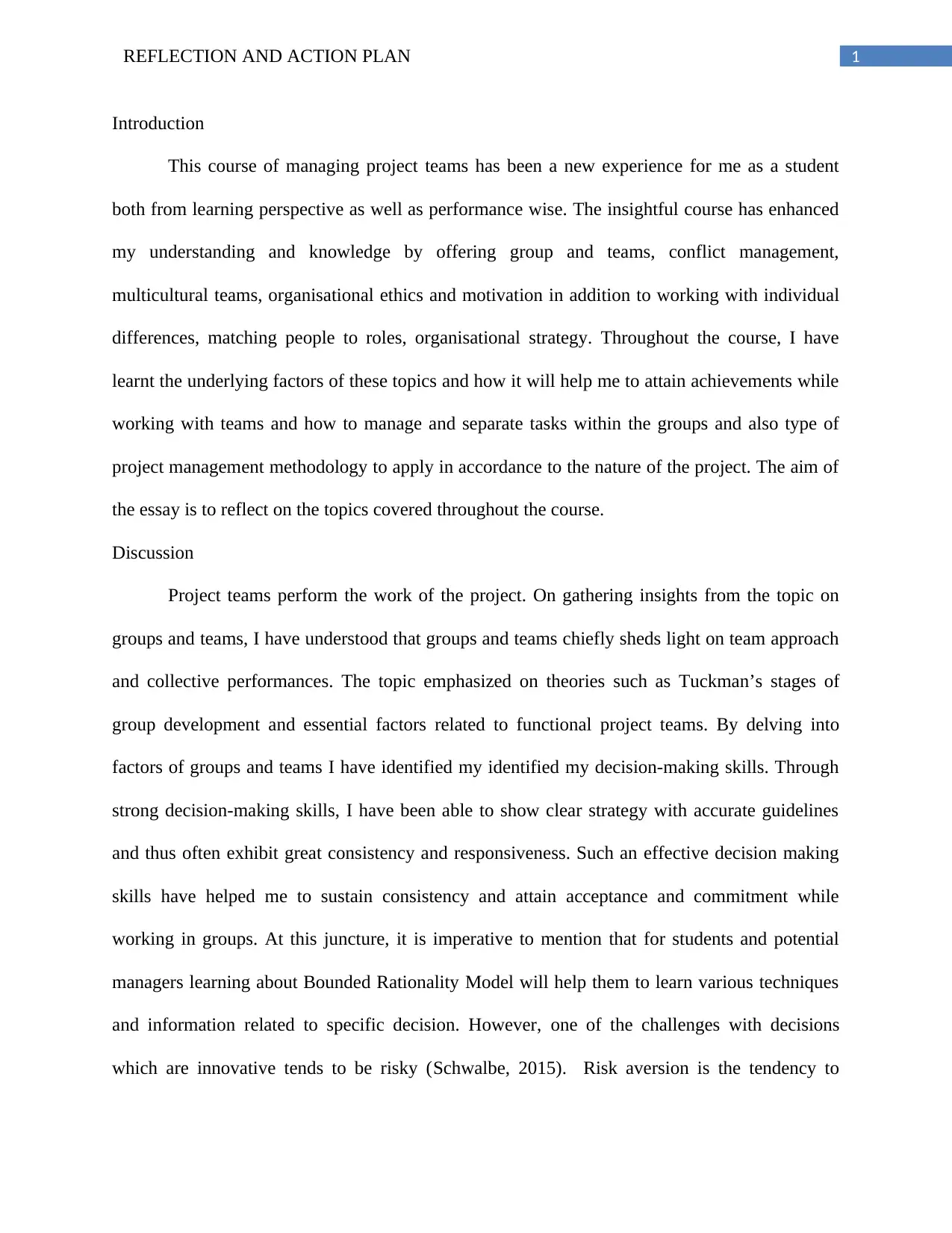
1REFLECTION AND ACTION PLAN
Introduction
This course of managing project teams has been a new experience for me as a student
both from learning perspective as well as performance wise. The insightful course has enhanced
my understanding and knowledge by offering group and teams, conflict management,
multicultural teams, organisational ethics and motivation in addition to working with individual
differences, matching people to roles, organisational strategy. Throughout the course, I have
learnt the underlying factors of these topics and how it will help me to attain achievements while
working with teams and how to manage and separate tasks within the groups and also type of
project management methodology to apply in accordance to the nature of the project. The aim of
the essay is to reflect on the topics covered throughout the course.
Discussion
Project teams perform the work of the project. On gathering insights from the topic on
groups and teams, I have understood that groups and teams chiefly sheds light on team approach
and collective performances. The topic emphasized on theories such as Tuckman’s stages of
group development and essential factors related to functional project teams. By delving into
factors of groups and teams I have identified my identified my decision-making skills. Through
strong decision-making skills, I have been able to show clear strategy with accurate guidelines
and thus often exhibit great consistency and responsiveness. Such an effective decision making
skills have helped me to sustain consistency and attain acceptance and commitment while
working in groups. At this juncture, it is imperative to mention that for students and potential
managers learning about Bounded Rationality Model will help them to learn various techniques
and information related to specific decision. However, one of the challenges with decisions
which are innovative tends to be risky (Schwalbe, 2015). Risk aversion is the tendency to
Introduction
This course of managing project teams has been a new experience for me as a student
both from learning perspective as well as performance wise. The insightful course has enhanced
my understanding and knowledge by offering group and teams, conflict management,
multicultural teams, organisational ethics and motivation in addition to working with individual
differences, matching people to roles, organisational strategy. Throughout the course, I have
learnt the underlying factors of these topics and how it will help me to attain achievements while
working with teams and how to manage and separate tasks within the groups and also type of
project management methodology to apply in accordance to the nature of the project. The aim of
the essay is to reflect on the topics covered throughout the course.
Discussion
Project teams perform the work of the project. On gathering insights from the topic on
groups and teams, I have understood that groups and teams chiefly sheds light on team approach
and collective performances. The topic emphasized on theories such as Tuckman’s stages of
group development and essential factors related to functional project teams. By delving into
factors of groups and teams I have identified my identified my decision-making skills. Through
strong decision-making skills, I have been able to show clear strategy with accurate guidelines
and thus often exhibit great consistency and responsiveness. Such an effective decision making
skills have helped me to sustain consistency and attain acceptance and commitment while
working in groups. At this juncture, it is imperative to mention that for students and potential
managers learning about Bounded Rationality Model will help them to learn various techniques
and information related to specific decision. However, one of the challenges with decisions
which are innovative tends to be risky (Schwalbe, 2015). Risk aversion is the tendency to
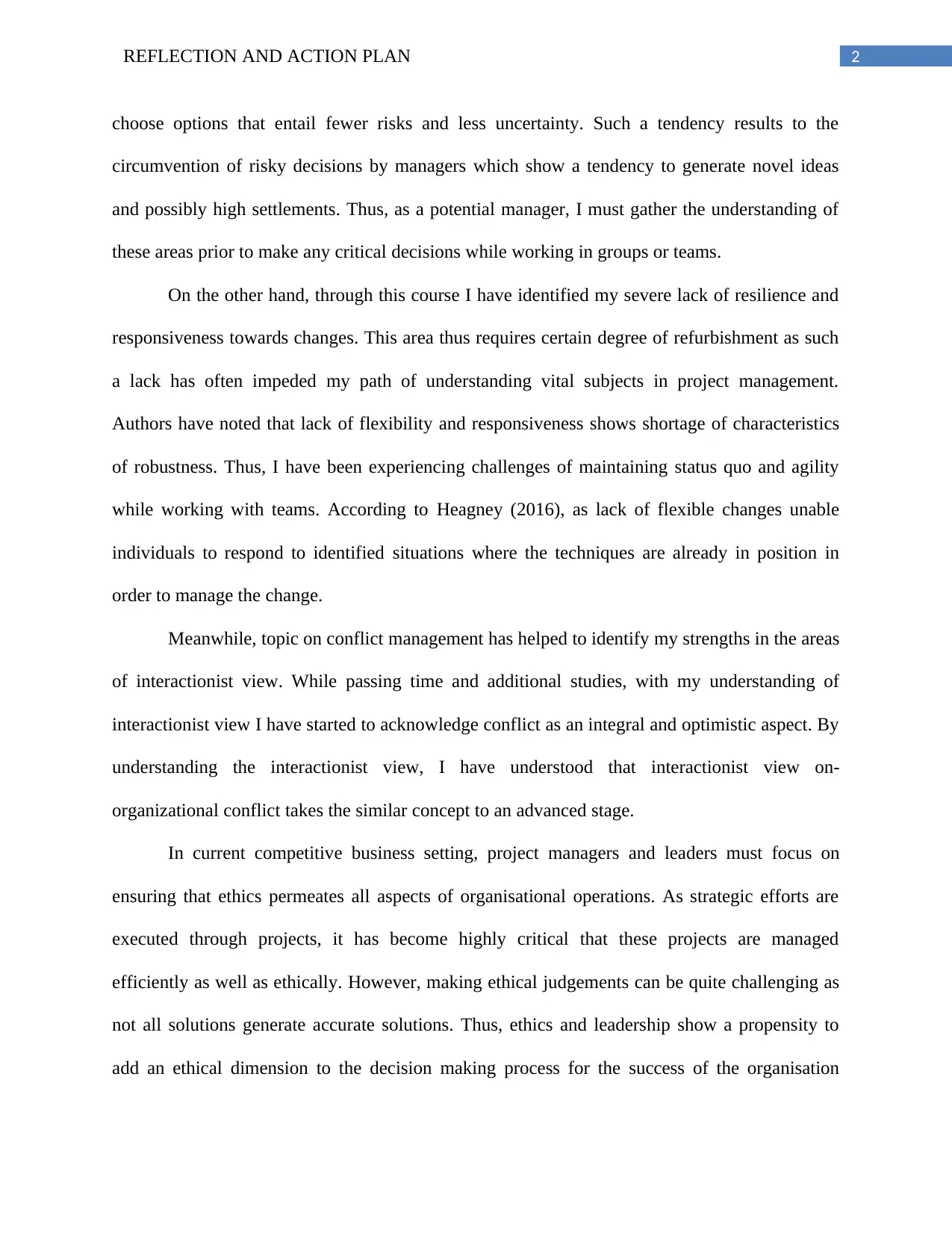
2REFLECTION AND ACTION PLAN
choose options that entail fewer risks and less uncertainty. Such a tendency results to the
circumvention of risky decisions by managers which show a tendency to generate novel ideas
and possibly high settlements. Thus, as a potential manager, I must gather the understanding of
these areas prior to make any critical decisions while working in groups or teams.
On the other hand, through this course I have identified my severe lack of resilience and
responsiveness towards changes. This area thus requires certain degree of refurbishment as such
a lack has often impeded my path of understanding vital subjects in project management.
Authors have noted that lack of flexibility and responsiveness shows shortage of characteristics
of robustness. Thus, I have been experiencing challenges of maintaining status quo and agility
while working with teams. According to Heagney (2016), as lack of flexible changes unable
individuals to respond to identified situations where the techniques are already in position in
order to manage the change.
Meanwhile, topic on conflict management has helped to identify my strengths in the areas
of interactionist view. While passing time and additional studies, with my understanding of
interactionist view I have started to acknowledge conflict as an integral and optimistic aspect. By
understanding the interactionist view, I have understood that interactionist view on-
organizational conflict takes the similar concept to an advanced stage.
In current competitive business setting, project managers and leaders must focus on
ensuring that ethics permeates all aspects of organisational operations. As strategic efforts are
executed through projects, it has become highly critical that these projects are managed
efficiently as well as ethically. However, making ethical judgements can be quite challenging as
not all solutions generate accurate solutions. Thus, ethics and leadership show a propensity to
add an ethical dimension to the decision making process for the success of the organisation
choose options that entail fewer risks and less uncertainty. Such a tendency results to the
circumvention of risky decisions by managers which show a tendency to generate novel ideas
and possibly high settlements. Thus, as a potential manager, I must gather the understanding of
these areas prior to make any critical decisions while working in groups or teams.
On the other hand, through this course I have identified my severe lack of resilience and
responsiveness towards changes. This area thus requires certain degree of refurbishment as such
a lack has often impeded my path of understanding vital subjects in project management.
Authors have noted that lack of flexibility and responsiveness shows shortage of characteristics
of robustness. Thus, I have been experiencing challenges of maintaining status quo and agility
while working with teams. According to Heagney (2016), as lack of flexible changes unable
individuals to respond to identified situations where the techniques are already in position in
order to manage the change.
Meanwhile, topic on conflict management has helped to identify my strengths in the areas
of interactionist view. While passing time and additional studies, with my understanding of
interactionist view I have started to acknowledge conflict as an integral and optimistic aspect. By
understanding the interactionist view, I have understood that interactionist view on-
organizational conflict takes the similar concept to an advanced stage.
In current competitive business setting, project managers and leaders must focus on
ensuring that ethics permeates all aspects of organisational operations. As strategic efforts are
executed through projects, it has become highly critical that these projects are managed
efficiently as well as ethically. However, making ethical judgements can be quite challenging as
not all solutions generate accurate solutions. Thus, ethics and leadership show a propensity to
add an ethical dimension to the decision making process for the success of the organisation
⊘ This is a preview!⊘
Do you want full access?
Subscribe today to unlock all pages.

Trusted by 1+ million students worldwide
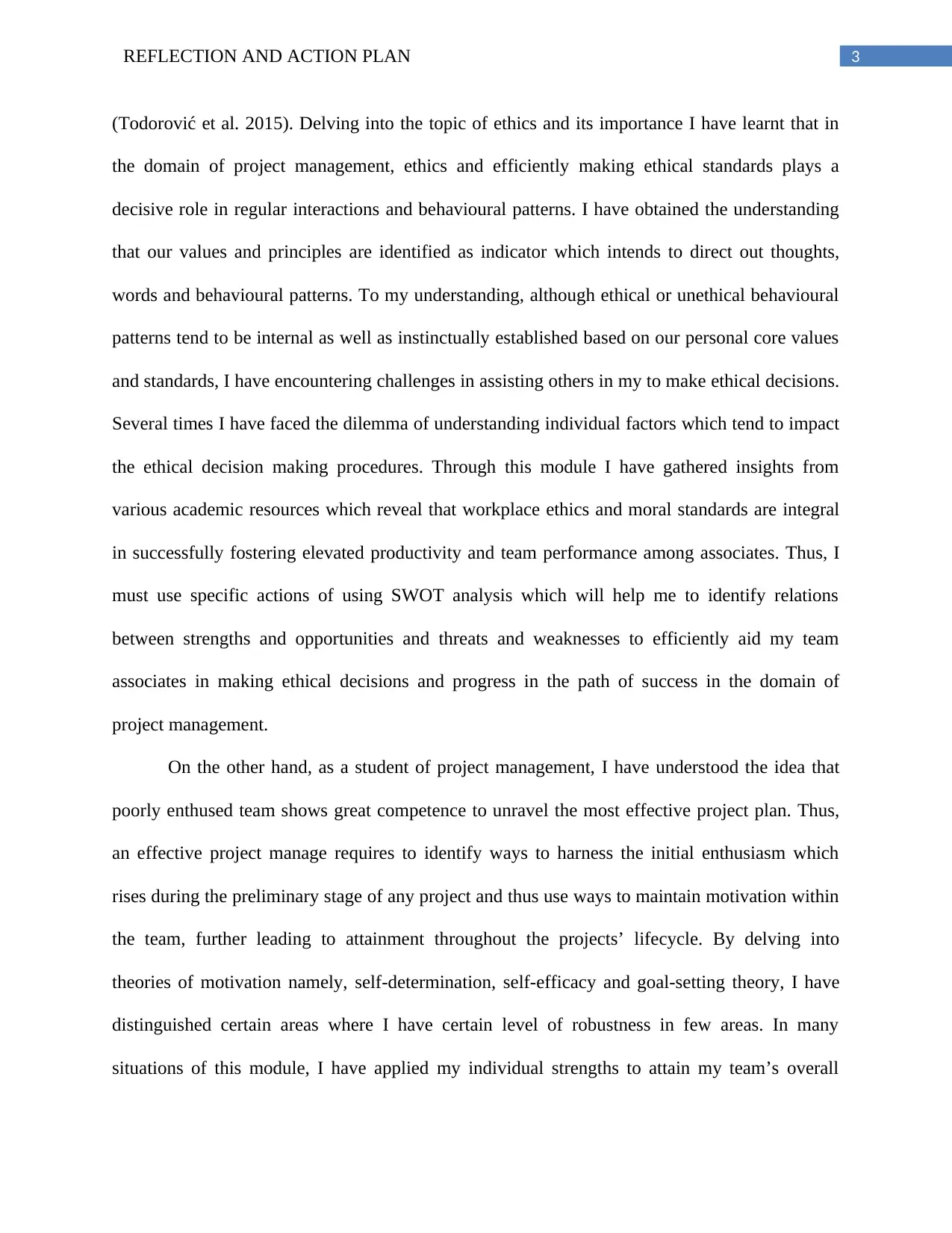
3REFLECTION AND ACTION PLAN
(Todorović et al. 2015). Delving into the topic of ethics and its importance I have learnt that in
the domain of project management, ethics and efficiently making ethical standards plays a
decisive role in regular interactions and behavioural patterns. I have obtained the understanding
that our values and principles are identified as indicator which intends to direct out thoughts,
words and behavioural patterns. To my understanding, although ethical or unethical behavioural
patterns tend to be internal as well as instinctually established based on our personal core values
and standards, I have encountering challenges in assisting others in my to make ethical decisions.
Several times I have faced the dilemma of understanding individual factors which tend to impact
the ethical decision making procedures. Through this module I have gathered insights from
various academic resources which reveal that workplace ethics and moral standards are integral
in successfully fostering elevated productivity and team performance among associates. Thus, I
must use specific actions of using SWOT analysis which will help me to identify relations
between strengths and opportunities and threats and weaknesses to efficiently aid my team
associates in making ethical decisions and progress in the path of success in the domain of
project management.
On the other hand, as a student of project management, I have understood the idea that
poorly enthused team shows great competence to unravel the most effective project plan. Thus,
an effective project manage requires to identify ways to harness the initial enthusiasm which
rises during the preliminary stage of any project and thus use ways to maintain motivation within
the team, further leading to attainment throughout the projects’ lifecycle. By delving into
theories of motivation namely, self-determination, self-efficacy and goal-setting theory, I have
distinguished certain areas where I have certain level of robustness in few areas. In many
situations of this module, I have applied my individual strengths to attain my team’s overall
(Todorović et al. 2015). Delving into the topic of ethics and its importance I have learnt that in
the domain of project management, ethics and efficiently making ethical standards plays a
decisive role in regular interactions and behavioural patterns. I have obtained the understanding
that our values and principles are identified as indicator which intends to direct out thoughts,
words and behavioural patterns. To my understanding, although ethical or unethical behavioural
patterns tend to be internal as well as instinctually established based on our personal core values
and standards, I have encountering challenges in assisting others in my to make ethical decisions.
Several times I have faced the dilemma of understanding individual factors which tend to impact
the ethical decision making procedures. Through this module I have gathered insights from
various academic resources which reveal that workplace ethics and moral standards are integral
in successfully fostering elevated productivity and team performance among associates. Thus, I
must use specific actions of using SWOT analysis which will help me to identify relations
between strengths and opportunities and threats and weaknesses to efficiently aid my team
associates in making ethical decisions and progress in the path of success in the domain of
project management.
On the other hand, as a student of project management, I have understood the idea that
poorly enthused team shows great competence to unravel the most effective project plan. Thus,
an effective project manage requires to identify ways to harness the initial enthusiasm which
rises during the preliminary stage of any project and thus use ways to maintain motivation within
the team, further leading to attainment throughout the projects’ lifecycle. By delving into
theories of motivation namely, self-determination, self-efficacy and goal-setting theory, I have
distinguished certain areas where I have certain level of robustness in few areas. In many
situations of this module, I have applied my individual strengths to attain my team’s overall
Paraphrase This Document
Need a fresh take? Get an instant paraphrase of this document with our AI Paraphraser
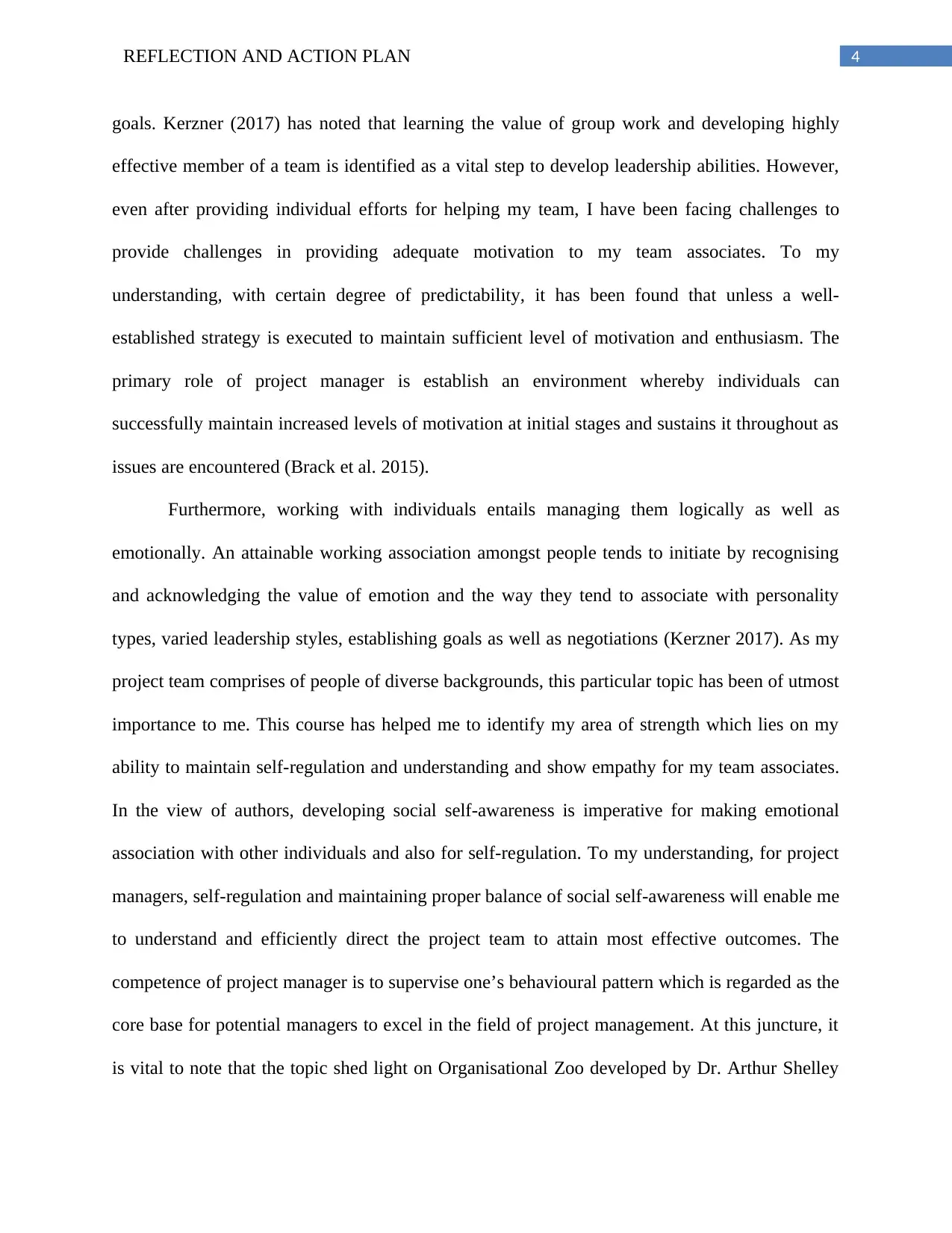
4REFLECTION AND ACTION PLAN
goals. Kerzner (2017) has noted that learning the value of group work and developing highly
effective member of a team is identified as a vital step to develop leadership abilities. However,
even after providing individual efforts for helping my team, I have been facing challenges to
provide challenges in providing adequate motivation to my team associates. To my
understanding, with certain degree of predictability, it has been found that unless a well-
established strategy is executed to maintain sufficient level of motivation and enthusiasm. The
primary role of project manager is establish an environment whereby individuals can
successfully maintain increased levels of motivation at initial stages and sustains it throughout as
issues are encountered (Brack et al. 2015).
Furthermore, working with individuals entails managing them logically as well as
emotionally. An attainable working association amongst people tends to initiate by recognising
and acknowledging the value of emotion and the way they tend to associate with personality
types, varied leadership styles, establishing goals as well as negotiations (Kerzner 2017). As my
project team comprises of people of diverse backgrounds, this particular topic has been of utmost
importance to me. This course has helped me to identify my area of strength which lies on my
ability to maintain self-regulation and understanding and show empathy for my team associates.
In the view of authors, developing social self-awareness is imperative for making emotional
association with other individuals and also for self-regulation. To my understanding, for project
managers, self-regulation and maintaining proper balance of social self-awareness will enable me
to understand and efficiently direct the project team to attain most effective outcomes. The
competence of project manager is to supervise one’s behavioural pattern which is regarded as the
core base for potential managers to excel in the field of project management. At this juncture, it
is vital to note that the topic shed light on Organisational Zoo developed by Dr. Arthur Shelley
goals. Kerzner (2017) has noted that learning the value of group work and developing highly
effective member of a team is identified as a vital step to develop leadership abilities. However,
even after providing individual efforts for helping my team, I have been facing challenges to
provide challenges in providing adequate motivation to my team associates. To my
understanding, with certain degree of predictability, it has been found that unless a well-
established strategy is executed to maintain sufficient level of motivation and enthusiasm. The
primary role of project manager is establish an environment whereby individuals can
successfully maintain increased levels of motivation at initial stages and sustains it throughout as
issues are encountered (Brack et al. 2015).
Furthermore, working with individuals entails managing them logically as well as
emotionally. An attainable working association amongst people tends to initiate by recognising
and acknowledging the value of emotion and the way they tend to associate with personality
types, varied leadership styles, establishing goals as well as negotiations (Kerzner 2017). As my
project team comprises of people of diverse backgrounds, this particular topic has been of utmost
importance to me. This course has helped me to identify my area of strength which lies on my
ability to maintain self-regulation and understanding and show empathy for my team associates.
In the view of authors, developing social self-awareness is imperative for making emotional
association with other individuals and also for self-regulation. To my understanding, for project
managers, self-regulation and maintaining proper balance of social self-awareness will enable me
to understand and efficiently direct the project team to attain most effective outcomes. The
competence of project manager is to supervise one’s behavioural pattern which is regarded as the
core base for potential managers to excel in the field of project management. At this juncture, it
is vital to note that the topic shed light on Organisational Zoo developed by Dr. Arthur Shelley
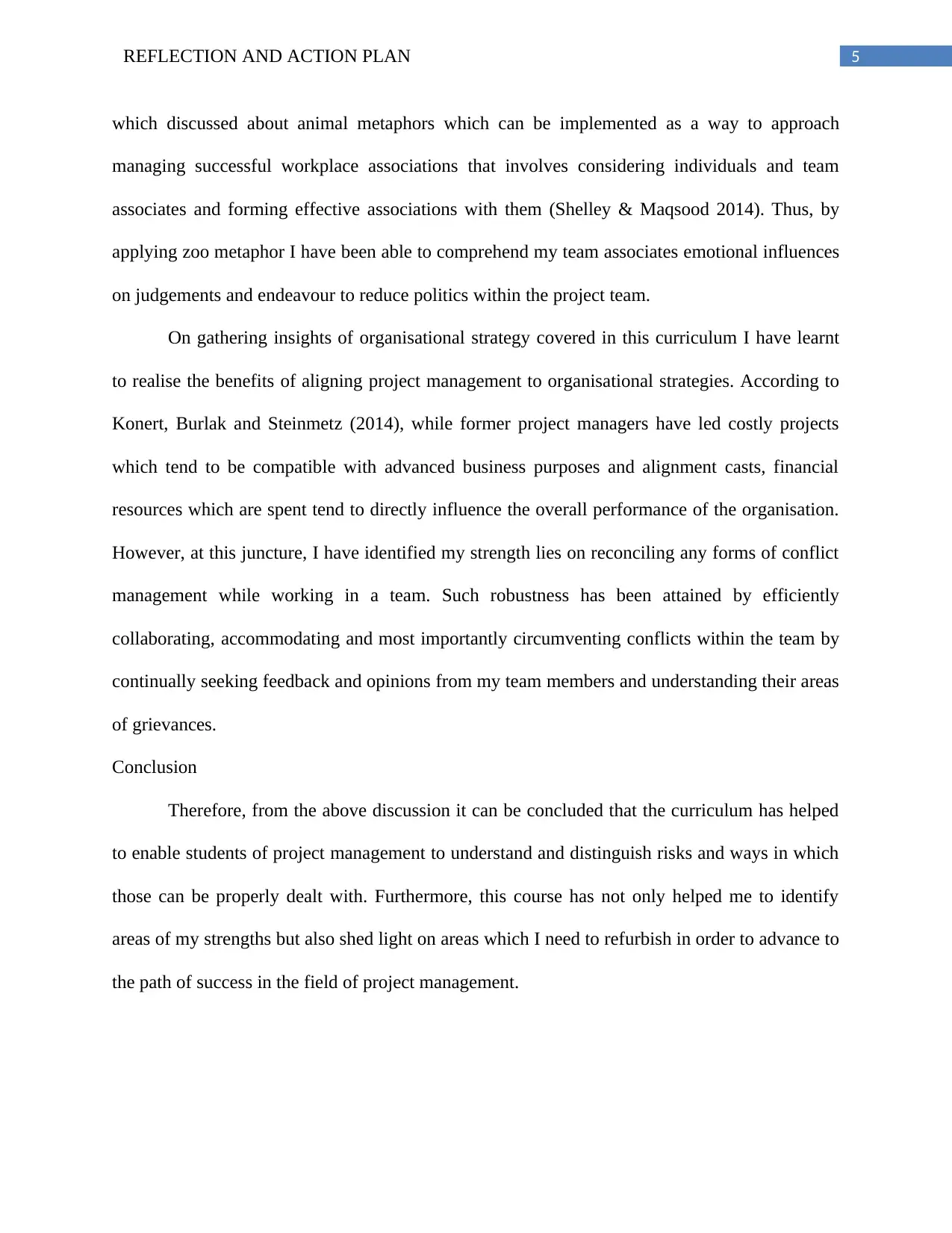
5REFLECTION AND ACTION PLAN
which discussed about animal metaphors which can be implemented as a way to approach
managing successful workplace associations that involves considering individuals and team
associates and forming effective associations with them (Shelley & Maqsood 2014). Thus, by
applying zoo metaphor I have been able to comprehend my team associates emotional influences
on judgements and endeavour to reduce politics within the project team.
On gathering insights of organisational strategy covered in this curriculum I have learnt
to realise the benefits of aligning project management to organisational strategies. According to
Konert, Burlak and Steinmetz (2014), while former project managers have led costly projects
which tend to be compatible with advanced business purposes and alignment casts, financial
resources which are spent tend to directly influence the overall performance of the organisation.
However, at this juncture, I have identified my strength lies on reconciling any forms of conflict
management while working in a team. Such robustness has been attained by efficiently
collaborating, accommodating and most importantly circumventing conflicts within the team by
continually seeking feedback and opinions from my team members and understanding their areas
of grievances.
Conclusion
Therefore, from the above discussion it can be concluded that the curriculum has helped
to enable students of project management to understand and distinguish risks and ways in which
those can be properly dealt with. Furthermore, this course has not only helped me to identify
areas of my strengths but also shed light on areas which I need to refurbish in order to advance to
the path of success in the field of project management.
which discussed about animal metaphors which can be implemented as a way to approach
managing successful workplace associations that involves considering individuals and team
associates and forming effective associations with them (Shelley & Maqsood 2014). Thus, by
applying zoo metaphor I have been able to comprehend my team associates emotional influences
on judgements and endeavour to reduce politics within the project team.
On gathering insights of organisational strategy covered in this curriculum I have learnt
to realise the benefits of aligning project management to organisational strategies. According to
Konert, Burlak and Steinmetz (2014), while former project managers have led costly projects
which tend to be compatible with advanced business purposes and alignment casts, financial
resources which are spent tend to directly influence the overall performance of the organisation.
However, at this juncture, I have identified my strength lies on reconciling any forms of conflict
management while working in a team. Such robustness has been attained by efficiently
collaborating, accommodating and most importantly circumventing conflicts within the team by
continually seeking feedback and opinions from my team members and understanding their areas
of grievances.
Conclusion
Therefore, from the above discussion it can be concluded that the curriculum has helped
to enable students of project management to understand and distinguish risks and ways in which
those can be properly dealt with. Furthermore, this course has not only helped me to identify
areas of my strengths but also shed light on areas which I need to refurbish in order to advance to
the path of success in the field of project management.
⊘ This is a preview!⊘
Do you want full access?
Subscribe today to unlock all pages.

Trusted by 1+ million students worldwide
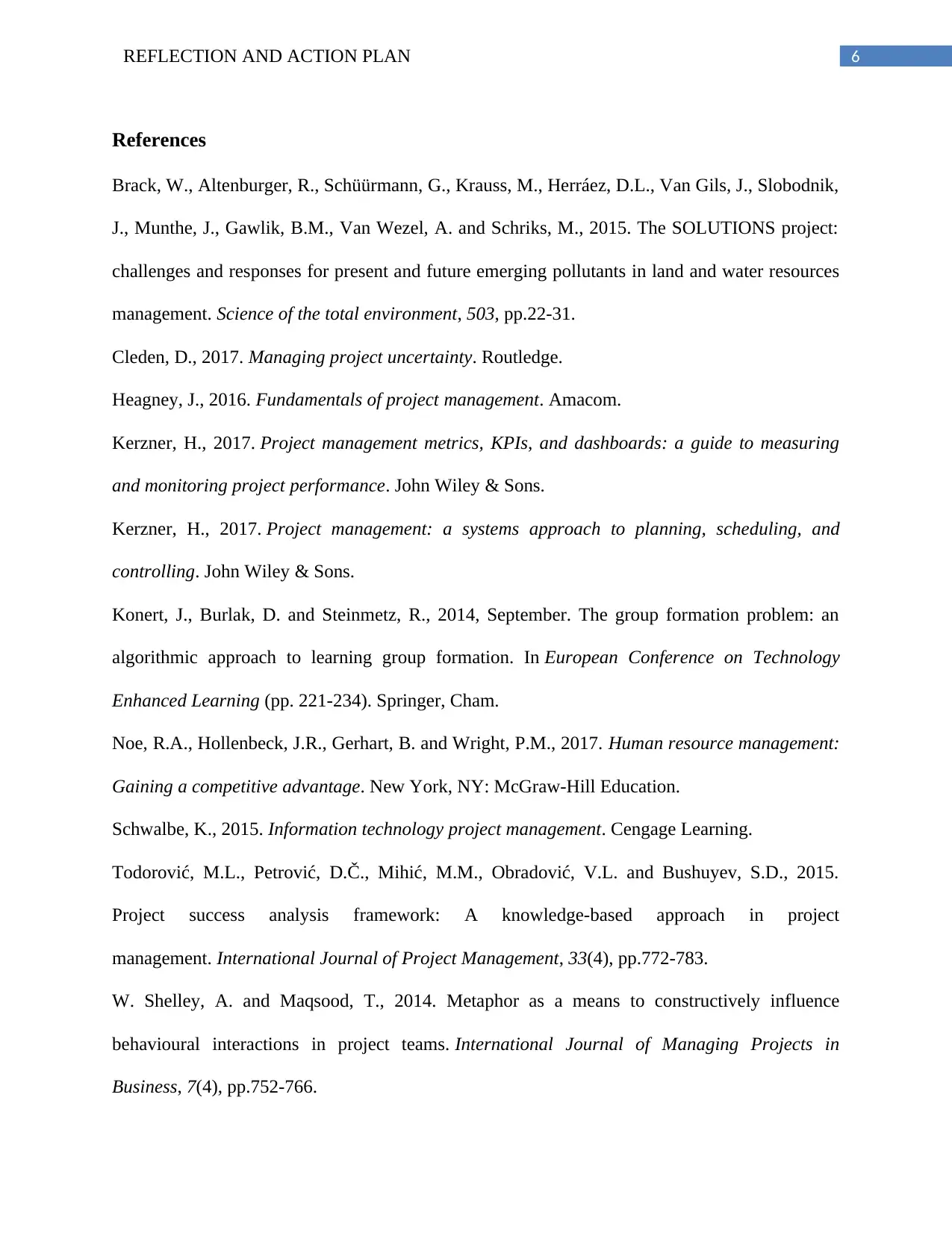
6REFLECTION AND ACTION PLAN
References
Brack, W., Altenburger, R., Schüürmann, G., Krauss, M., Herráez, D.L., Van Gils, J., Slobodnik,
J., Munthe, J., Gawlik, B.M., Van Wezel, A. and Schriks, M., 2015. The SOLUTIONS project:
challenges and responses for present and future emerging pollutants in land and water resources
management. Science of the total environment, 503, pp.22-31.
Cleden, D., 2017. Managing project uncertainty. Routledge.
Heagney, J., 2016. Fundamentals of project management. Amacom.
Kerzner, H., 2017. Project management metrics, KPIs, and dashboards: a guide to measuring
and monitoring project performance. John Wiley & Sons.
Kerzner, H., 2017. Project management: a systems approach to planning, scheduling, and
controlling. John Wiley & Sons.
Konert, J., Burlak, D. and Steinmetz, R., 2014, September. The group formation problem: an
algorithmic approach to learning group formation. In European Conference on Technology
Enhanced Learning (pp. 221-234). Springer, Cham.
Noe, R.A., Hollenbeck, J.R., Gerhart, B. and Wright, P.M., 2017. Human resource management:
Gaining a competitive advantage. New York, NY: McGraw-Hill Education.
Schwalbe, K., 2015. Information technology project management. Cengage Learning.
Todorović, M.L., Petrović, D.Č., Mihić, M.M., Obradović, V.L. and Bushuyev, S.D., 2015.
Project success analysis framework: A knowledge-based approach in project
management. International Journal of Project Management, 33(4), pp.772-783.
W. Shelley, A. and Maqsood, T., 2014. Metaphor as a means to constructively influence
behavioural interactions in project teams. International Journal of Managing Projects in
Business, 7(4), pp.752-766.
References
Brack, W., Altenburger, R., Schüürmann, G., Krauss, M., Herráez, D.L., Van Gils, J., Slobodnik,
J., Munthe, J., Gawlik, B.M., Van Wezel, A. and Schriks, M., 2015. The SOLUTIONS project:
challenges and responses for present and future emerging pollutants in land and water resources
management. Science of the total environment, 503, pp.22-31.
Cleden, D., 2017. Managing project uncertainty. Routledge.
Heagney, J., 2016. Fundamentals of project management. Amacom.
Kerzner, H., 2017. Project management metrics, KPIs, and dashboards: a guide to measuring
and monitoring project performance. John Wiley & Sons.
Kerzner, H., 2017. Project management: a systems approach to planning, scheduling, and
controlling. John Wiley & Sons.
Konert, J., Burlak, D. and Steinmetz, R., 2014, September. The group formation problem: an
algorithmic approach to learning group formation. In European Conference on Technology
Enhanced Learning (pp. 221-234). Springer, Cham.
Noe, R.A., Hollenbeck, J.R., Gerhart, B. and Wright, P.M., 2017. Human resource management:
Gaining a competitive advantage. New York, NY: McGraw-Hill Education.
Schwalbe, K., 2015. Information technology project management. Cengage Learning.
Todorović, M.L., Petrović, D.Č., Mihić, M.M., Obradović, V.L. and Bushuyev, S.D., 2015.
Project success analysis framework: A knowledge-based approach in project
management. International Journal of Project Management, 33(4), pp.772-783.
W. Shelley, A. and Maqsood, T., 2014. Metaphor as a means to constructively influence
behavioural interactions in project teams. International Journal of Managing Projects in
Business, 7(4), pp.752-766.
1 out of 7
Related Documents
Your All-in-One AI-Powered Toolkit for Academic Success.
+13062052269
info@desklib.com
Available 24*7 on WhatsApp / Email
![[object Object]](/_next/static/media/star-bottom.7253800d.svg)
Unlock your academic potential
Copyright © 2020–2025 A2Z Services. All Rights Reserved. Developed and managed by ZUCOL.





